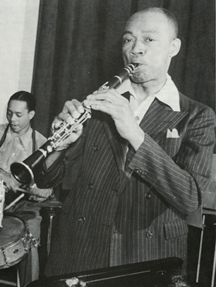Edmond Hall
| Edmond Hall | |
|---|---|
 |
|
| Background information | |
| Birth name | Edmond Hall |
| Born |
May 15, 1901 Reserve, Louisiana, US |
| Died | February 11, 1967 (aged 65) Boston, Massachusetts |
| Genres |
Swing New Orleans Jazz |
| Occupation(s) | Clarinetist |
| Instruments | Clarinet, Alto saxophone, Baritone saxophone |
| Associated acts | Buddy Petit, Claude Hopkins, Billy Hicks, Henry "Red" Allen, Teddy Wilson, Louis Armstrong |
Edmond Hall (May 15, 1901 – February 11, 1967) was an American jazz clarinetist and bandleader.
Over his long career Hall worked extensively with many top performers as both a sideman and bandleader and is perhaps best known for the 1941 chamber jazz song "Profoundly Blue," which is regarded as a pre-World War II jazz classic.
Born in Reserve, Louisiana, about 40 miles west of New Orleans on the Mississippi River, Hall and his siblings were born into a musical family. His father, Edward Blainey Hall, and mother, Caroline Duhe, had eight children, Priscilla (1893), Moretta (1895), Viola (1897), Robert (1899), Edmond (1901), Clarence (1903), Edward (1905) and Herbert (1907).
His father, Edward, played the clarinet in the Onward Brass Band, joined by Edmond's maternal uncles, Jules Duhe on trombone, Lawrence Duhe on clarinet, and Edmond Duhe on guitar. The Hall brothers, Robert, Edmond, and Herbert, all became clarinetists, but Edmond was first taught guitar by his uncle Edmond. When Hall finally picked up the clarinet, "he could play it within a week. He started Monday and played it Saturday," his brother Herb recalled in an interview with Manfred Selchow who wrote an extensive Edmond Hall biography (A Bio-Discographical Scrapbook on Edmond Hall), Profoundly Blue in 1988.
Hall worked as a farm-hand, but by 1919 he had become tired of the hard work, and despite his parents' worries of finding a decent job as a musician, he left for New Orleans. The first New Orleans band he played with was that of Bud Rousell (Bud Russell). He also played with Jack Carey (trombone) and blues cornetist Chris Kelley.
Hall's first big break came in late 1920, when he went to a dance at Economy Hall. The legendary Buddy Petit was playing. "When I got inside, it was a revelation", Hall said. Petit's clarinet player had left the band just a few days later, and the following Saturday Ed Hall was sitting in with Petit's band as a replacement. In 1922 Ed Hall left Petit.
Arriving in Pensacola, Florida, he joined Lee Collins' band. In 1923 he joined Mack Thomas' band; from there he went on to play with the Pensacola Jazzers, where Hall met the young trumpeter Charles Williams, better known as Cootie Williams. From there he went on to play with "Eagle Eye" Shields. Together with Cootie Williams, he left Shields and joined Alonzo Ross' band, the Alonzo Ross DeLuxe Syncopators, in early 1927. In 1928 the band's pianist Arthur "Happy" Ford formed a new group and immediately hired Hall and Williams.
...
Wikipedia
